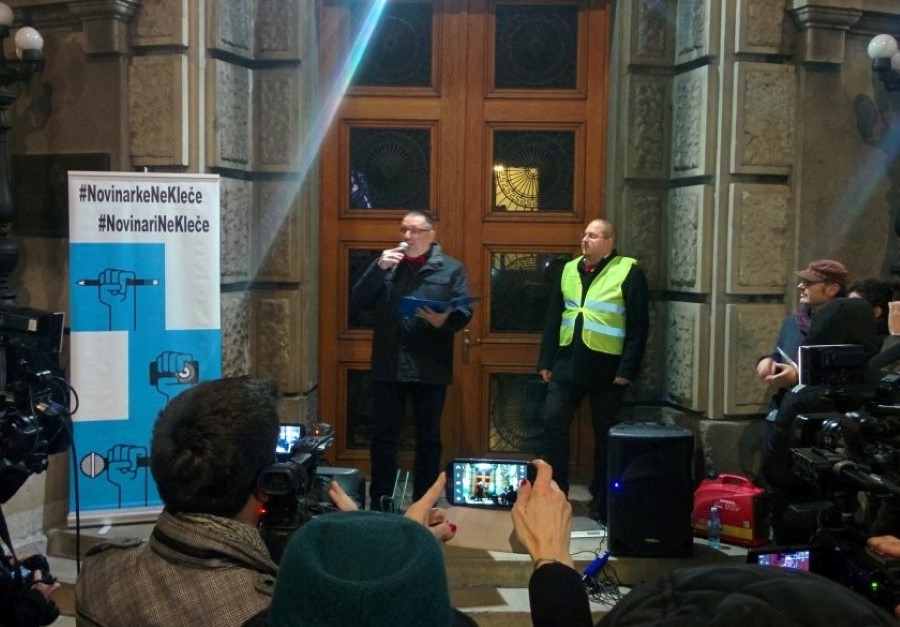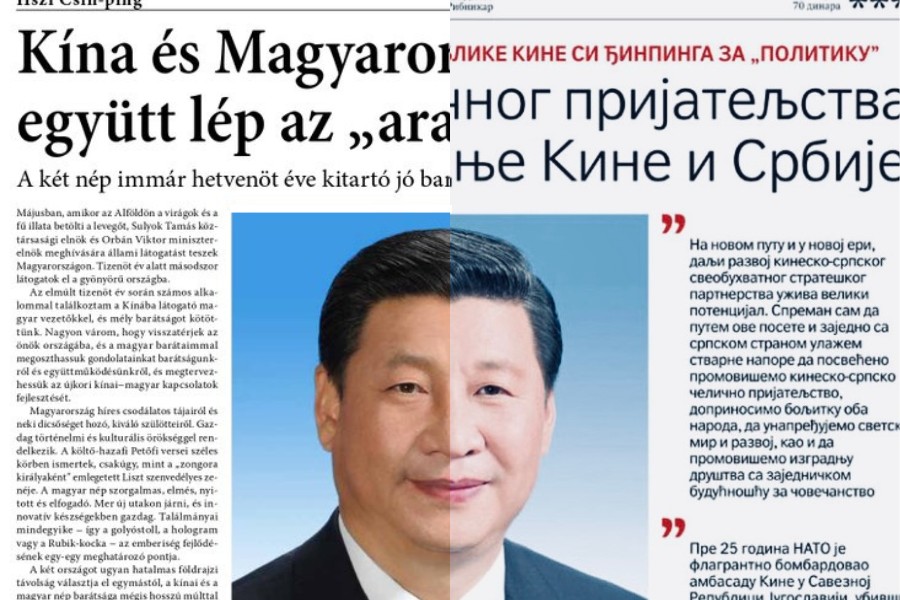 This story delves into the grim situation of Serbian media workers, showing that nothing, not even a contract, can protect them from the dictates of profit
This story delves into the grim situation of Serbian media workers, showing that nothing, not even a contract, can protect them from the dictates of profit
Every other Monday in December, a Christmas tree in front of the Serbian government building shined with the message „Journalists do not kneel.“ This had been arranged by a group of about a hundred media workers gathered under the initiative „Journalists do not kneel“ initiative formed on December 7 in protest against Defense Minister Bratislav Gasic not being dimissed despite his statement that he preferred “female journalists who kneel down easily“.
Two months later, Gasic was replaced and awards for bad treatment of the media were given to Serbian minister. This initiative continued with a set of demands for the authorities, in connection with the media situation. Decades of degrading treatment of the media profession by the authorities has thus finally been put on the agenda.
Yet, journalists do not have much respect from the public in whose interests they are supposed to work. The public expects that journalists play the important social role of someone who will ask sensitive questions to authorities and encourage debate on the most pressing topics. However, despite these great expectations and consequent criticism of journalists, no one asks about their economic and social protection: the type of contracts they have, how much they are paid and whether there is someone who can protect them after they have asked a sensitive question. All this comes during an economic downturn, limited marketing ability, the privatization of the media, non-transparent media ownership, heavy political pressure, and consequent self-censorship.
There is no official statistical data on the economic and social situation of media workers. The data collected for the purpose of this research is imprecise and partial, and confirms the bleak situation for journalists in Serbia, who are torn between the public interest and the authorities, poor working conditions and layoffs. They do not have the economic and social protection they need to successfully perform their important social role.
There is also no data on the total number of journalists in Serbia. The most recent census in 2011 shows that 53,281 people were employed in the media. This figure also includes programmers, producers, technicians, and so on. However, it is estimated that the number of journalists in the country stands at a few thousand. According to the latest data from the National Employment Service, unemployment benefits are given to 1,103 journalists.
REDUNDANT AT 46
Photojournalist Aleksandar Stankovic, known also as Dlakavac, remembers that he returned from holiday that May and felt nauseous to go back to work. He knew that being 46, the oldest on the list of photojournalists, being made redundant was pretty certain. Two days after returning from vacation, Stankovic suffered a heart attack and had a stent installed. According to him, long-term stress caused by working conditions contributed to the attack, while the announced redundancies were only the trigger.
Research carried out by The Center for Media and Media Research at the Faculty of Political Science in 2011 and entitled „Profession at the crossroads ─ journalism on the threshold of the information society“ shows that nearly 60% of journalists who are employed fear losing their jobs. Half of them have salaries below or near the national average, ranging from 150 to 400 euros. It is encouraging that two-thirds of respondents (76.54%) are permanently employed, although the figure mostly includes journalists from older generations, while a third of honorary media workers get their salary in cash.
No journalist – investigative or freelance, or those who work in mainstream media outlets or foreign media companies – is spared from these socio-economic problems and the uncertainty that arises from them, regardless of the contract they have. They all work for owners who regard profit and good relationships with the authorities as the top priority. They all work under contracts that can be terminated at any time as a punishment for asking „unsuitable“ questions or expressing anything which could potentially threaten those business and political ties.
The interviewees for this article agree that they have stopped being media professionals working in the public interest and have turned into corporate slaves. „I started calling Blic a plant where we screw lids on jars, and we all know what’s in the jars. No one asks us, someone else is filling them and then someone is counting the jars,“ says Tamara Spaic, a journalist who spent 27 years as a journalist, 10 of which were for the company Ringier Axel Springer, which publishes the daily Blic, among other papers. In her opinion, the citizens of Serbia have a „fake journalism with a rotten support and a rotten deal with the authorities on whom they depend at the end of the day.“
Punishable activities
One would have thought that a Swiss–German company operating in Serbia would be socially responsible, caring about its employees and the contracts under which they work. It turned out that the wave of mass layoffs of journalists took place in Ringier Axel Springer’s office in Belgrade.
The interviewed employees say that everything about the company, from content to the fate of the staff, is about making money. For months there had been rumours in the corridors at Lower Dorcol (where the company is placed) about some kind of reorganisation and systematisation that included layoffs. Journalists were upset because they did not know who, when and under what criteria they would be dismissed. Spaic says that she could not stand watching people crying in the corners and thus dared to create a petition in December 2014 calling on the top management to discuss the criteria and modalities for the layoffs and reduction of salaries.
However, this attempt failed due to fear among employees. Only 20 employees, which is about a tenth of the overall number of media workers in the company, signed the petition. Shortly thereafter, Spaic was invited to an interview with management where she was told that she could no longer work there.
Narly 60% of journalists who are employed fear losing their jobs. Half of them have salaries below or near the national average, ranging from 150 to 400 euros.
Although, under Article 152 of the Criminal Code of the Republic of Serbia, the prevention of political, union and other associations and activities in Serbia is a criminal offense, interviewees from Ringier say that there is an unwritten ban on the establishment of unions in the company: whoever dares to set up a union will be fired. On the other hand, Ringier has unions in the other countries where it operates.
Spaic has long had problems working in such conditions where her stories were being changed, sensitive parts cut out, and her story ideas related to the corrupt practices of the people closest to Prime Minister Aleksandar Vucic being turned down.
Shortly after this failed petition attempt by Tamara Spaic, the biggest wave of redundancies at the company started in May 2015. This, in the view of employees, contributed to the most unpleasant atmosphere in the company’s building ever.
Photojournalist Aleksandar Stankovic, known also as Dlakavac, remembers that he returned from holiday that May and felt nauseous to go back to work. He knew that being 46, the oldest on the list of photojournalists, being made redundant was pretty certain. In addition to this, he says, „my talents and my activities have been made meaningless and devalued in the last few years. Journalists can no longer deliver information, but emotions.“ On one occasion, when children drowned in a river, he was expected to have shot pictures that would exploit the human tragedy in order to increase newspapers sales: „ideally, I was supposed to bring a picture of a mother who jumps to the coffin.“
Two days after returning from vacation, Stankovic suffered a heart attack and had a stent installed. According to him, long-term stress caused by working conditions contributed to the attack, while the announced redundancies were only the trigger. Stankovic stayed with the company, but with a different approach to work and the urge to leave the company and move to the countryside. „It’s sad because this was my life’s work. I was privileged to have been paid to do my hobby,“ he added, after 20 years in journalism.
„A small cog in the machinery of the corporation“
Indicating that no one is protected, not even editors, deputy editor in chief of the weekly paper NIN and editor of the political column, Antonela Riha, was fired by Ringier in April. After a two-year professional dispute with the NIN editor in chief, Milan Culibrk, Riha admits that she expected to be moved to another position, but not to be fired after being a full-time employee and journalist with years of experience. What is disturbing is the way it happened. „On April 17, we had an editorial meeting where I proposed an interview with a writer, and Culibrk agreed to it only to tell me afterwards that I was fired.“ The company’s explanation was that they had to fire someone, and that Riha had the worst assessement in the newsroom, even though the evaluation process had yet to start for the year. Culibrk did not want to go back to the case, but merely pointed out that the reasons for the dismissal were not political in nature, and that NIN had for years been a sharp critic of the government.
Despite these great expectations and consequent criticism of journalists, no one asks about their economic and social protection: the type of contracts they have, how much they are paid and whether there is someone who can protect them after they have asked a sensitive question.
„I was in total shock; it went by in three minutes, or that is how it looked to me, as it passed very quickly,“ Riha recalls. „He [Culibrk] gave me the evaluation paper but I wasn’t interested in it. How can you evaluate the general ethics or work on the computer on which the journalist writes? It’s silly, but it’s very good for when you want to fire someone.“ And so Riha, with an employment contract for an indefinite period, suddenly and without notice was supposed to clear her desk immediately, and found herself on the street. In addition, she received a small severance package for two years at NIN because, according to the new Serbian Labour Law, work with other employers is not to be taken into account.
„For the next few days, I would wake up with the feeling that this had not really happened, it was impossible. I thought it was surreal,“ says Riha. She filed a lawsuit against the company, which has been accepted, and now she is awaiting the trial. Meanwhile, she works as a freelance journalist, as no one would hire her, she added.
„You are a small cog in the machinery of the corporation, machinery that serves to earn money for the corporation, regardless of the stories you may have. You, as a reporter, function under marketing and management, in order to make money,“ she concluded.
Two days after Riha was handed her notice, her colleague from the economics desk, 43-year-old Katarina Preradovic, died suddenly. To date, the principal cause remains unknown.
Mass redundancies
The biggest wave of dismissals was when 15 employees of Ringier Axel Springer Serbia, including single mothers and journalists with several years to go until retirement, were laid off. These were full-time journalists, mostly experienced, who were fired with no warnings, but were told suddenly that they would no longer be employed because of falling circulation and mismanagement in general.
After secure contracts and the jobs they had, this group found itself on the street without any protection, union or organisation on their side. The news of mass redundancies rocked the entire media sphere. Journalists’ associations strictly condemned the move, while Ringier remained silent. Director General Jelena Drakulic Petrovic has not responded to requests for an interview for this article.
They all work for owners who regard profit and good relationships with the authorities as the top priority. They all work under contracts that can be terminated at any time as a punishment for asking „unsuitable“ questions or expressing anything which could potentially threaten those business and political ties.
However, CEO of Ringier Axel Springer Media AG, Mark Dekan, sent a letter on June 10 to the president of theEuropean Federation of Journalists (EFJ), Mogens Blücher Bjeregard, and the Secretary General of the Association, Ricardo Gutierrez, in which he explained the reasons for the decision in Serbia. „Our management in Serbia has carefully discussed the issue with employees and explained why this decision was unfortunately inevitable […] These measures were inevitable due to the decline in advertising revenues resulting from the difficult economic situation in Serbia, so that the company can remain competitive and to ensure a healthy business.“ The five redundant people who were interviewed for the purpose of writing this article claim that Ringier had not attempted any discussion with them prior to dimissal, and it remains unknown whether someone in a managerial position bears any responsibility for the poor performance of the company.
One of the people dismissed, Nikola Travica, a journalist at the Alo magazine (Ringier Axel Springer) from Novi Sad, came to the Belgrade office one day in May to celebrate finishing his MA. But, instead of a celebration, he was told that he would be working for 5,000 dinars, instead of the previous 50,000 dinars per month. He had spent eight years with Alo working under an author’s contract, extended every six months, which went against the Labour Law. „I did not complain about it because I had a regular salary and paid contributions,“ said Travica.
He first thought about suing the company, but soon realised it would not be a good option since the lawsuit means a request to return to work, which he did not want. So he decided to send a letter to the key people in Ringier Axel Springer, Mark Dekan and Michael Ringier, in order to inform them about what was happening in their company in Serbia.
The other 15 ex-employees were also unwilling to sue the company. „This is a small circle of people, and you never know who will end up where, and I’m here in the profession, I do not know to do anything else,“ says one, who insisted on anonymity.
Union failure
This raises the question as to whether the mass redundancies would have been possible if there had been a trade union. Dragana Cabarkapa, president of the Journalists’ Union of Serbia (SINOS) says that she had been involved in attempts to establish trade union branches within Ringier, but it was not successful. She says she had been rejected by the company, which insisted that they would respect all workers’ rights and that there was no need for the establishment of trade unions. „People from Blic told me with strict confidentiality that if someone mentions the union founding at Ringier, he or she would be fired,“ says Cabarkapa, adding that trade unionism in the Serbian media scene is „suppressed“.
Dejan Kozul, a media researcher who deals with the situation of media workers and is a representative of NUNS, also believes that unionism is dying and that the few existing unions in the media remain as a legacy, while the private media generally prohibit it. „Although this is contrary to the Labour Law, this is done by implanting fear among journalists so they know what will happen to them if they dare to something in this regard,“ said Kozul.
One of the two largest trade unions in Serbia, Solidarnost, has no branches in the media. Tin Antic, president of Solidarnost, believes that the rights of media workers in Serbia do not exist. “They are constantly being blackmailed, are under pressure and subject to threats. Media owners compete to flatter the authorities, and the workers suffer, „says Antic.
The only thing a fired reporter can get is free legal advice at one of the journalists’ associations. But associations do not have more power and jurisdiction under its statute.
Slobodan Ciric is vice president of the Journalists Association in Serbia (UNS) and journalist of the weekly paper Napred in Valjevo. He participated in the UNS’s research on the position of journalists in 2014, and believes that the media situation „is disasterous from an economic perspective, and from a professional perspective quite threatened.“ In his view, the most alarming thing is that journalists work under poor contracts which are made, he says, in a „take it or leave it“ manner.
No one is being spared
Some journalists are still owed wages and severance pay. Irena Jerkovic, who was a permanently employed editor at the now-defunct Avala TV, says that her company owes her more than five months’ salary. But for the sake of her health and peace of mind, she has left the issue behind her, as she did not want to accumulate resentment due to a situation in which her workers’ rights had been betrayed. „What is important to note is that the law could not have been so easily circumvented had the competent institutions reacted,“ adds Jerkovic.
RINGIER AXEL SPRINGER MEDIA
Ringier Axel Springer Media AG is owned by two companies: 50% Axel Springer AG in Germany, and 50% Ringier based in Switzerland. It is one of the largest media companies in Serbia, owning Blic, 24 Sata, Blic Zena, Blic Puls, NIN and Auto Bild. Ringier Axel Springer also has a 25.1% share in the printing house APM Print. In 2010, the company launched Nonstopshop and the travel site Superodmor, and two years later it took over the portals Nekretnine.rs and Mojauto.rs. The first issue of Blic was released on 16 September 16, 1996, and Ringier entered the Serbian market in 2004.
Jovana Djurovic, a one-time permanently employed journalist with cable Nova TV, has yet to get a severance pay upon being made redundant in 2014. It has been for a year now that Djurovic has appeared in court against Nova TV, trying to get what she deserves.
On the other hand, the situation of media workers who do not have employment contracts but are hired on the basis of author’s contracts is even worse. Some of the most prominent investigative journalists, and also freelance ones, belong to this group. Investigative journalism in Serbia is mainly funded by donations and is directly dependent on it. Vladimir Kostic from the Center for Investigative Reporting in Serbia (CINS) says that such funding enables a greater degree of independence because the media does not depend on advertisers. However, this leads to financial uncertainty, which is the reason why these journalists are often employed part-time on the basis of author’s contracts, and not as employees for an indefinite period. Kostic, however, insists that investigative journalism has other motives and that nothing will prevent them from achieving their goals. „My colleagues from the Center for Investigative Journalism and I are aware of this and we are paying that price,“ says Kostic. Freelance and investigative reporters, who are not usually working on a full-time basis, cannot get protection from unions because the Labour Law envisions that only employed persons are allowed to be members of a union.
Meanwhile, the journalists mentioned at the beginning of this article, who decorated the government’s tree, continue to protest for their profession. But the chances are slim that Santa Claus will leave them what they want under the tree.
Related articles / Povezane priče
Izmešu loših uslova za rad i otkaza
This article has been produced with the financial assistance of the South East European Media Observatory project, supported by the European Union. The contents of this article are the sole responsibility of the author and can in no way be taken to reflect the views of the European Union.








 Deset medijskih sporazuma za „zajedničku budućnost” sa Kinom, zemljom cenzure i progona novinara
Deset medijskih sporazuma za „zajedničku budućnost” sa Kinom, zemljom cenzure i progona novinara Kako ojačati lokalne medije i obnoviti informisanje o radu opštinskih vlasti: Britansko rešenje daje rezultate
Kako ojačati lokalne medije i obnoviti informisanje o radu opštinskih vlasti: Britansko rešenje daje rezultate Vučić i Tramp: Netrpeljivost prema medijima i podrugljivo odbacivanje drugačijeg mišljenja
Vučić i Tramp: Netrpeljivost prema medijima i podrugljivo odbacivanje drugačijeg mišljenja
Ostavljanje komentara je privremeno obustavljeno iz tehničkih razloga. Hvala na razumevanju.